

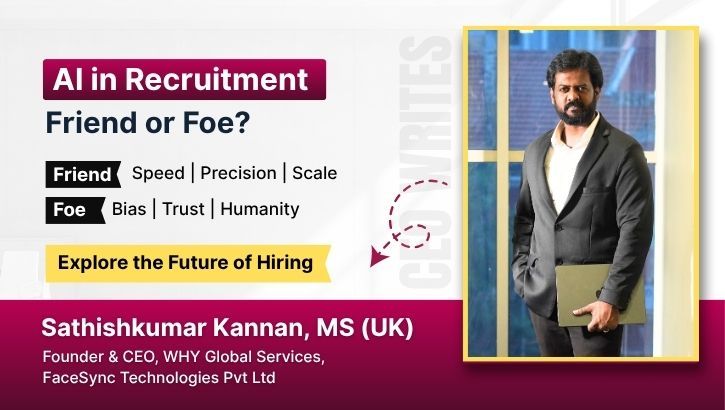
Recruiters are under more pressure today than ever before. Job postings attract thousands of applications overnight, yet companies still struggle to find the right talent. Gen Z candidates exit the hiring pipeline if the process feels slow or impersonal, while CEOs demand faster hiring cycles and lower costs. The result? A perfect storm where traditional recruitment methods are stretched to breaking point.
Into this storm enters Artificial Intelligence, promising speed, precision, and scale. AI can scan resumes in seconds, predict candidate performance, and even conduct video interview assessments. For HR leaders, this sounds like the ultimate solution.
But here’s the dilemma: what happens when a candidate is rejected, not by a recruiter, not by a manager, but by an algorithm? No explanation, no feedback, just a cold decision. For millions of job seekers, this is no longer hypothetical, it’s reality.
And so, the question remains: is AI in recruitment the long-awaited friend that empowers HR, or the silent foe that risks dehumanizing careers?
Artificial Intelligence is no longer a futuristic concept in HR, it’s already embedded in the recruitment lifecycle. From the moment a job is posted to the moment an offer is rolled out, AI systems are quietly reshaping the way organizations attract and assess talent.
For organizations, the benefits are undeniable: faster hiring cycles, lower costs, and data-backed decisions. For recruiters, AI removes repetitive work and provides more time to focus on strategy and relationships.
Yet, behind this efficiency lies a critical question: are we trading human connection for machine precision?
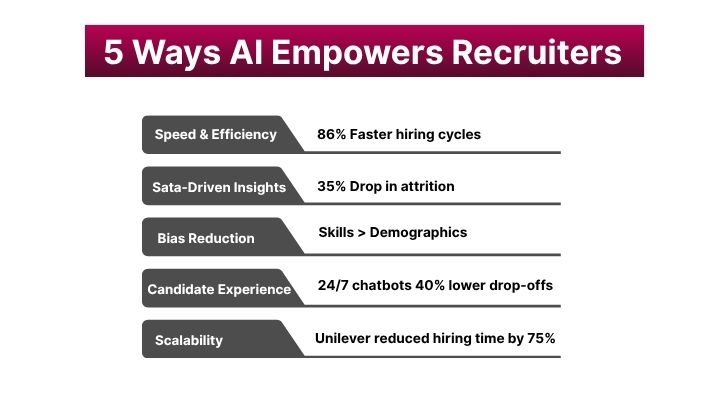
AI is helping HR teams in five powerful ways:
1. Speed & Efficiency – Faster shortlisting and hiring cycles.
2. Data-Driven Insights – Predictive analytics for performance & retention.
3. Bias Reduction – Fairer, skills-focused recruitment.
4. Candidate Experience – Instant, personalized engagement.
5. Scalability – Consistency in high-volume hiring.
Recruitment timelines that once stretched into weeks can now be compressed into days with AI automation.
Impact for HR: Faster hiring means capturing top talent before competitors do.
Predictive analytics helps recruiters move beyond gut instinct to evidence-based hiring.
Impact for HR: Stronger hires, reduced turnover, and improved credibility with leadership.
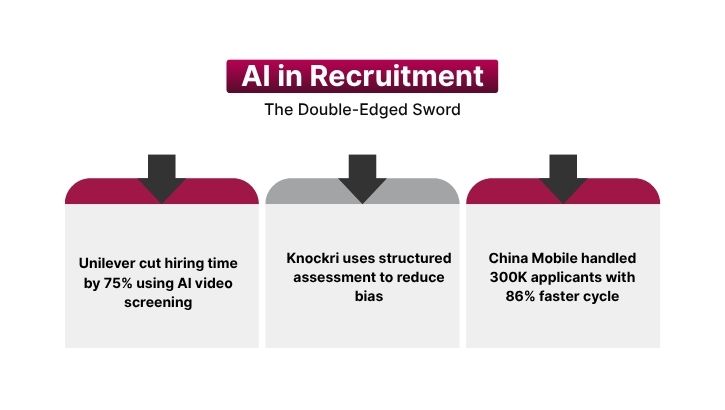
AI can help minimize unconscious human bias, if trained and audited properly.
Impact for HR: More inclusive recruitment and stronger diversity outcomes.
In a Gen Z-driven market, slow or unresponsive processes drive candidates away. AI tools enhance engagement.
Impact for HR: Happier candidates and stronger employer reputation.
For large-scale or seasonal hiring, AI brings consistency and speed without compromising standards.
Impact for HR: Reliable, high-volume recruitment that stays consistent across geographies.
The risks of AI in recruitment fall into five major challenges:
1. Algorithmic Bias – Reinforcing existing inequalities.
2. Loss of Human Touch – Hiring feels cold and transactional.
3. Over-Automation – Blind reliance reduces recruiter judgment.
4. Privacy & Ethics Concerns – Sensitive data and lack of transparency.
5. Trust Deficit – Candidates doubt fairness of machine-driven hiring.
AI systems are only as fair as the data they are trained on. If the historical data reflects bias, the algorithm can reinforce it.
Impact for HR: Risk of reputational damage and legal challenges if AI perpetuates unfair hiring practices.
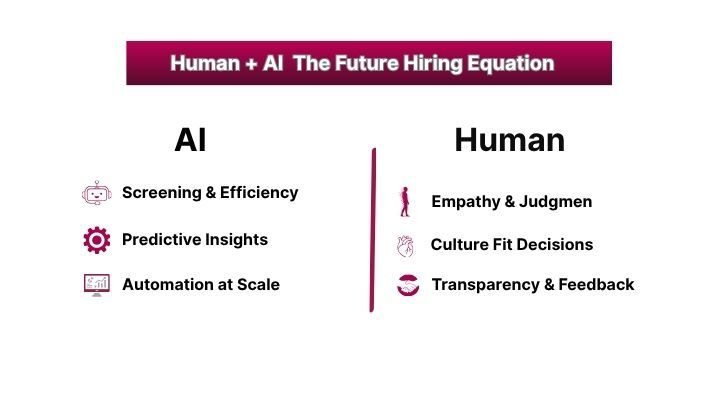
Recruitment is not just about skills, it’s also about empathy, intuition, and cultural alignment. AI struggles to replicate the nuance of human judgment.
Impact for HR: A hiring process that feels cold or robotic can harm employer branding and increase candidate drop-offs.
There’s a danger in giving AI too much control. When recruiters depend blindly on algorithms, they risk losing the very skills that make them valuable.
Impact for HR: Missed talent opportunities and weakened recruiter expertise.
AI tools often collect and process sensitive candidate data, raising concerns around consent and privacy.
Impact for HR: Breaches of trust and possible regulatory penalties if ethical standards are not maintained.
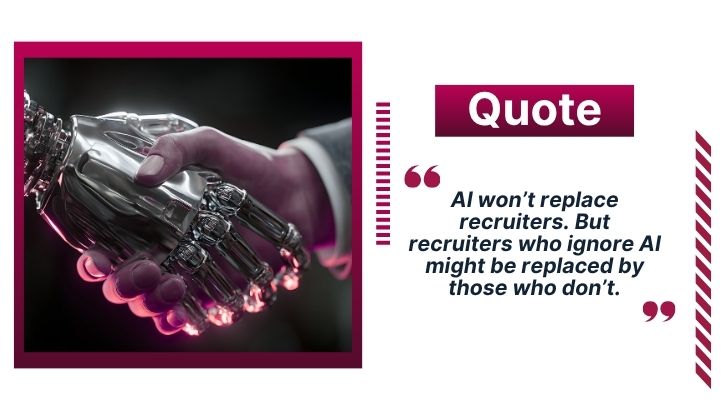
At the end of the day, careers are personal. Candidates are skeptical when they feel their futures are being decided by machines.
Impact for HR: Lower candidate trust, reduced application rates, and damage to long-term employer reputation.
The future of recruitment is not AI vs. humans, it’s AI with humans. The best outcomes come from combining:
1. AI for Screening & Efficiency: Automate repetitive tasks.
2. Human Oversight in Decision-Making: Add judgment and empathy.
3. Transparency with Candidates: Build trust in AI-assisted processes.
4. Personalized Candidate Journeys: Blend automation with human touch.
5. Continuous Monitoring & Auditing: Keep AI ethical, fair, and effective.
AI should handle the high-volume, repetitive work: resume parsing, initial assessments, scheduling.
Takeaway: Let AI take care of the grunt work, not the human connection.
Final hiring decisions must remain human-led. Recruiters can factor in intangibles like cultural alignment, motivation, and growth potential.
Takeaway: Recruiters must stay in the driver’s seat: AI is the navigator, not the captain.
Candidates deserve to know when and how AI is being used in their assessment.
Takeaway: Trust grows when HR is open about the role of AI in recruitment.
AI can tailor content and job recommendations, while recruiters provide empathy and storytelling.
Takeaway: Use AI to personalize the process, and humans to humanize it.
AI models must be regularly checked for bias, errors, and drift.
Takeaway: AI in recruitment is not “set it and forget it”: it needs constant supervision.
So, is AI in recruitment a friend or foe? The truth is: it can be both. Left unchecked, it risks amplifying bias, eroding trust, and dehumanizing careers. Used wisely, it becomes an ally that accelerates hiring, improves diversity, and strengthens the bond between employer and employee.
The choice is not about machines versus humans. It is about how humans lead machines. The organizations that will thrive are the ones that use AI not to replace recruiters, but to elevate them combining speed with empathy, data with intuition, and automation with authenticity.
In the end, recruitment’s future won’t be decided by technology alone. It will be defined by the leaders who choose to balance innovation with humanity.